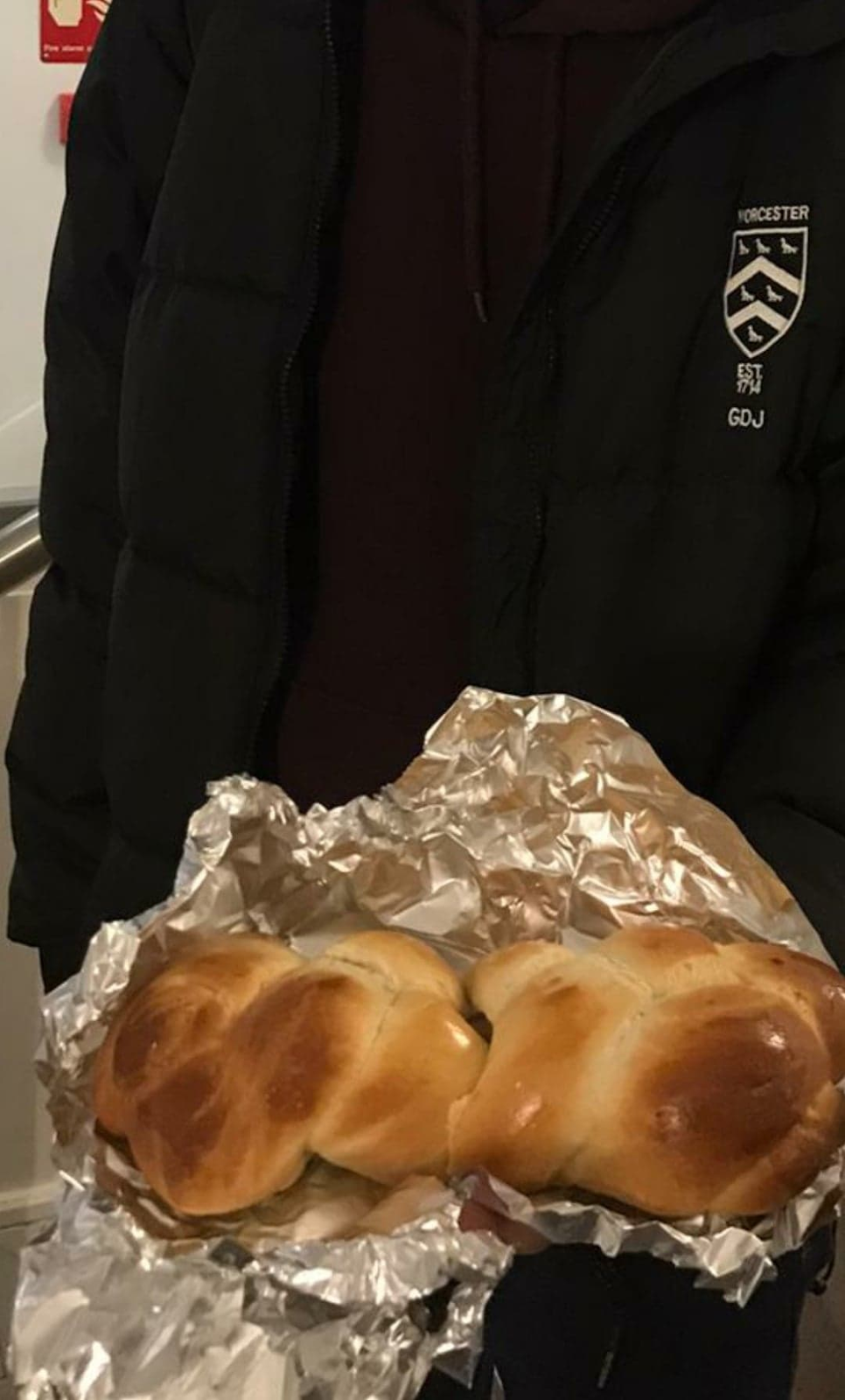The first national lockdown in the UK began on 23rd March 2020, less than two weeks after many Jews had been celebrating the festival of Purim. Little did any of us know at the time that this would be the last holiday celebrated under normal circumstances for over a year. Throughout the remainder of 2020 and well into 2021, on important occasions and holidays we would be calling family and friends over Zoom, battling the combined chaos of lagging wifi and the natural dispensation of large groups of Jews all to talk at once, in an attempt to preserve some semblance of the normal calendar year.
Holidays are the punctuation of our lives; they come around every year with comforting regularity, providing an opportunity for rest, reflection, and celebration. Our experience of Jewish holidays since the pandemic arrived may not have been quite the same as usual, but nonetheless amid the grinding monotony of Covid-era life they have functioned as small pockets of joy. Holding on to joy during bleak times is something which Jews have more or less become experts at over the millennia, and so it felt important to uphold that tradition. With the indispensable (and quintessentially Jewish) aid of vast quantities of carbohydrates, I’d like to think we’ve done a pretty good job.
Leah- Purim

The pandemic for me marked the beginning of my starting to pay attention to Jewish holidays outside of Passover and Hanukkah, the basic staples of many lax Jews’ calendar. As the world started to fall apart, I instinctively reached to pull the threads tying myself to my ancestors and my community tighter. This was no doubt reinforced by the sudden death of my grandma immediately prior to the pandemic hitting the UK; before I knew of a single person who had contracted Covid, my experience of 2020 was clouded by profound loss. On some subconscious level, I could not countenance that loss also representing a loss of my history and culture; of all the stories and the struggles that my grandma carried within her slight frame and her big heart.
My grandma and my mother, in accordance with the proud tradition of Jewish women, have always expressed love through food. As children, when we visited her home in Michigan, we used to call her “Kitchen Grandma” – a highly literal descriptor of her propensity for hovering around with plates of food and snacks at the ready. Therefore, even though I had never made hamantaschen or challah before, the process felt instinctively right as a means of processing grief and reconnecting with my family roots, the cornerstone of my identity.
I was particularly delighted to learn that hamantaschen, the triangular filled cookies eaten by Ashkenazi Jews at Purim, are believed by many Jews to symbolise the ears of Haman: the villain of the Book of Esther who sought to commit genocide against the Persian Jews. Nothing better sums up the unofficial motto of Jewish holidays: “They tried to kill us, we survived, let’s eat”. It is a reminder of the eternal resilience of the Jewish people, so long as, like the heroine Esther, we maintain the courage to speak up for ourselves. Besides, who wouldn’t enjoy the dramatic flair of celebrating survival by eating the (symbolic) ears of one’s enemies?
Pleasingly, making both hamantaschen and challah involved working with dough, the most emotionally satisfying of ingredients; its soft squidge under the fingertips cannot fail to reassure and to remind us that everything will be alright. Living in a pandemic is weird. Celebrating Jewish holidays for the first time during a pandemic is weirder. But the dough worked its magic; everything turned out more or less alright.
Tamzin – Shavuot

Shavuot, the Festival of Weeks, was last week. The timing could not have been more apt, as it marks the end of the period of 49 days after Pesach, a traditionally solemn time for the Jewish people, as marriages and ceremonies tend to be forbidden as we prepare to receive the Torah. Like the 17th May date for many of us, it marked the conclusion of a pretty long period without legally permitted parties. It is a joyous occasion where people join together to celebrate once again – and I personally ate a lot of cheesecake in the process.
When I was younger, all I knew about Shavuot was that it in some capacity involved my mother’s very delicious cheesecake. Last year, for some bizarre reason, creating the perfect cheesecake seemed more important than ever… and now we are already preparing for next week’s iteration too. I participated in a Zoom where we tried to produce some cheesecakes for the festival online together in our separate kitchens, and although it was a rather dysfunctional gathering – it resulted in one of most delicious cheesecakes we had ever produced.
I actually went around delivering parts of the cheesecake to local family and friends on those daily state-permitted walks we all remember so well. It brought the family together through our screens – those delicious, rich, creamy layers shared together amidst discordant sounds of people telling one another to “unmute” or to “go easy on the crust”.
Cheesecake is meant to be very sweet, representative of the milk and honey of the Promised Land. I wondered why I hadn’t ever really celebrated Shavuot before (other than eating cheesecake) and I believe this is because of the lack of real ritual involved in Shavuot, especially in comparison to other festivals like Pesach. As Rabbi Ismar Shorsch describes in an article, Shavuot is “ritually bereft” with “no absorbing home ritual that might unite family and friends in preparation and observance.”
So why do I find it exciting? What are we remembering? The festival commemorates the anniversary of the Jewish people receiving the Torah – a crucial unifying event for the Jewish people. There is definitely something exciting in the depiction of a group of people, encamped at the foot of Mount Sinai, anticipating the Torah together. It is exciting that many Jews celebrate by staying up all night on Erev Shavuot to study the Torah, in Tikkun Leyl Shavuot. I can imagine that a slice of cheesecake the following day has much the same restorative effects as a hot chocolate the morning after pulling an all-nighter for an essay crisis. As we *hopefully* return to studying in person in groups at university, I am sure we will appreciate how much learning together, and celebrating together, makes a huge difference to our experience as individuals.
We join together to share in something sweet, to celebrate Shavuot together. The collaborative, unifying emphasis of this festival seemed more crucial to me in the context of the pandemic than ever before. We can celebrate and learn together after a pretty bleak period. It is the togetherness, the sense of a community beyond the screens, all sharing cheesecake that really excites me.
Naomi – Passover

During the pandemic I have remained in Oxford for health and academic reasons and thus have been here solidly since January. This has meant that I have been away from my home over Pesach for the first time in my life. When I was younger my family and I used to travel to America every year to celebrate Pesach with my extended American family. I have vague memories of mega-synagogues and the most dramatic hunt for the afikomen I have ever been involved in. From my recollection of this defining moment for my seven-year-old self, we were all in a very large building with many rooms and the afikomen was hidden somewhere. There was a group of many children who were competing and I distinctly remember it being treated as a high-stakes competition in which we were told to begin searching as if it were a race. I didn’t find the afikomen but received a $2 consolation prize.
Aside from this dramatic highlight, the majority of my Pesach experiences have been at home in Aberdeen with my family. It’s fairly standard; we follow the Haggadah and eat matzah ball soup. The family Haggadahs that we have are uniquely entertaining though as they are my grandma’s old ones from the 1950s and so are predictably dodgy by modern politically correct standards. During the period around Pesach my mum hoards boxes of matzah and hides them from my brother as he would eat all the boxes at once if he could. My family are very big matzah fans. One of the setbacks of living in Aberdeen is that we can’t access specialised kosher food like people who live in large Jewish communities can and so we shamefully make do with the ‘not kosher for passover’ matzah available at our local Sainsbury’s.
This Pesach was unique in two ways. Firstly, I had to host it for the first time and realised I was so used to following the ceremony as someone else leads that I had never actually paid attention to the order in which things occurred, prompting a panicked text to my mum a few days before the Seder. It was very fortunate that Oxford JSoc offered free Seder kits to those in Oxford, allowing me to not worry about getting food items together. The second way in which this Seder was different from others was that I was only with my girlfriend for it rather than a larger group. This ended up being very advantageous as it meant the free JSoc food was enough for both of us.
The Seder itself was very standard. We laid the table in the official way and followed the Haggadah successfully. Our Seder leader, Skog, was highly successful in his role and while Elijah did not choose to drink from our offering, I’m sure he appreciated that it was poured in an Oxford Union shot glass. For the first time in my memory, the matzah I had was actually ‘kosher for passover’ although disappointingly I could not taste the difference; it appears certification from the Chief Rabbinate of Jerusalem does not add flavour. However, while indistinguishable from its imposter counterpart, in taste it did prove to be a very successful afikomen for my girlfriend -as despite my extreme efforts to disguise its hiding place she found it in under a minute.
I’ll be honest, I’ve never actually considered the meaning of Pesach. In my mind it has always just been ‘that one where you eat matzah ball soup, ask the four questions, and hunt down the hidden matzah for money’. This has not been aided by my total lack of Hebrew knowledge. I can truly state that I have never understood a single word spoken at synagogue. To many Jews, Pesach serves as the story of our perpetual persecution and eventual liberation, amplified by the saying ‘next year in Jerusalem’. This obviously today holds connotations of the modern state of Israel and so it may sound like an odd thing to toast – surely we can just get on a plane and go to Jerusalem like so many tourists do? However, historically and today this has held a more figurative meaning. ‘Jerusalem’ has been a metaphor for a place where we can be safe in a world without our persecution whatever that may mean. It is a symbol of resilience; no matter what we endure we always carry on with the hope that next year we will reach this ‘Jerusalem’.
Pesach is fundamentally a celebration of our survival. We celebrate our liberation from slavery in Egypt by eating a meal where we do things like eat salty parsley to remind us of the shed tears of our people (I know, dramatic) while also reclining and drinking wine. The resounding message is clear: ‘in every generation there is a new Pharaoh’. In every generation we will have to somehow fight for our survival against those who wish us wiped off the face of the earth, but in every generation we will arise victorious. This is certainly true for the story of mine and many other Ashkenazi families: Pogroms, Holocaust, Refuseniks and undoubtedly more challenges ahead as violent fascism rises across the West with recent fascist rallies in Spain and Italy to name a fraction. But the Jews are still here. Despite all these attempts, 14 million of us are still here and will continue to fight for the survival of our people in the memory of those who have been taken. Every generation a new Pharaoh arises, and every generation we must show resilience and bring ourselves to liberation. Every generation must carry on with the hope of someday finding ‘Jerusalem’.
Guy – Friday night dinner

For me, Jewish life has always been something inherently communal. Whether it be gathering with my extended family for Passover and Rosh Hashanah (the Jewish New Year), or experiencing Shabbat (the Jewish Sabbath) with friends on weekends away, the social aspect of Judaism has always been central to my experience of the religion.
One of my last memories of a normal Oxford was our JSoc Friday Night Dinner in 8th week. It all seemed a bit over the top at the time: being served food by committee members wearing gloves and a visor was something out of dystopian fiction, even as we sat ten to a table, tearing from the same loaf of challah bread. Within a week, such a gathering would be almost unthinkable, as the pandemic spread across the UK. Lockdown meant that my experience of Judaism changed massively. The big family gatherings for Passover and Rosh Hashanah were replaced with Zoom calls, whose novelty soon wore off. 100-person JSoc Friday Night Dinners were replaced by a small meal with just my household. Many of the practices and customs which were so integral to my culture and religion were no longer possible.
As things started to open up, we began to be able to find ways of celebrating in a Covid-safe way. A particular highlight of Michaelmas Term was the Jewish Society’s in-person Friday Night Dinners, all keeping to the rule of 6. They were a great chance to see old friends and meet new people, as well as to celebrate Shabbat together. As the tier system meant that new restrictions were put in place, we still found ways to celebrate – one particular highlight was a freezing Hanukkah celebration in my friend’s garden with doughnuts.
I’ve also really started baking more because of lockdown. I love making challah bread – almost like a really soft and pillowy brioche. Even at university, I’ve made big quantities of challah and handed it fresh out of the oven to friends, or made pitta bread and delivered them straight into people’s pidges. This has been a great way to connect with Jewish holidays, through procrastibaking and then eating the delicious end product. It’s been strange celebrating Jewish festivals in a pandemic, but I’d like to think that I’ve made the most of it.
Image credit: Aaron Beppu. License: CC BY-NC-SA 2.0.


